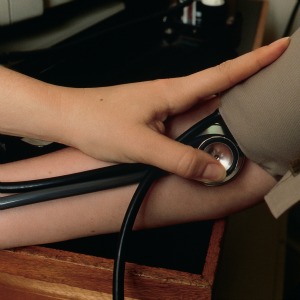Clinical clanger: ‘Your blood pressure’s too high so we need to increase your medication’

Dr Toni Hazell advises on supporting patients to improve adherence to medication regimes
Isabel is 55. She has been feeling dizzy and has had to sit down rapidly a few times. She says she might have fainted had there not been a chair available. It’s worse when she stands up. She saw the nurse last week who added a third antihypertensive drug, because her hypertension was poorly controlled.
The reality
Hands up anyone who can honestly say they always take medicines exactly as prescribed. Anyone? Didn’t think so. My hand isn’t up. Isabel’s seated BP is 122/76mmHg, falling to 98/60mmHg on standing. She admits she ‘has been a bit rubbish’ at taking her tablets and that the appointment with the nurse last week was a wake-up call. Having taken her previous two antihypertensives sporadically (she disliked the swollen ankles), she started taking them daily, along with the third one. The sudden start of effectively three drugs at once dropped her BP and made her dizzy. She agrees to go down to one drug, taken regularly, and a month later you are pleased to see her BP is normal, with no postural drop, and her dizziness has gone.
The issue
Between a third and a half of medicines prescribed for long-term conditions aren’t taken as recommended.1,2 NICE divides this into unintentional and intentional non-adherence. Intentional is obvious – the patient doesn’t want to take the drug, but does not say when it was prescribed. If you are open and patient centred, patients are more likely to feel able to say if they don’t want a medication.
Unintentional non-adherence is more complex. The patient may have memory or literacy issues,
or may not understand how to take the drugs. This can be dangerous. One study documented 25 deaths and 48 serious outcomes linked to daily (instead of weekly) dosing of methotrexate.3
Patients might be embarrassed to say they can’t afford the prescription charge. Do you routinely ask about this, or tell patients about pre-payment certificates?
They might forget. It is a routine part of my contraception counselling to ask patients who are taking the pill whether they remember it every day. Individual circumstances are important. A woman with a stable routine is more likely to remember than a teenager who hides the pill from her mum.
The evidence
It isn’t surprising that non-adherence is greatest when patients have no symptoms.4 But there are huge benefits to preventive treatment. One study demonstrated a 43% decline in stroke for the period 2012-15 compared with 2000-03, a change probably partly due to medical management of risk factors.5
However, it’s not surprising that if a medication seems to worsen your quality of life, you might not take it reliably.
Complexity of regime is also an issue. Evidence shows that more than half of patients don’t understand what their doctor has told them about taking medication, and that most cases of non-adherence involve omissions of doses or delays in dose timing. At least one person in seven in England is functionally illiterate and many are reluctant to admit this. A review showed depression negatively impacts adherence and longer-term drug regimes are also associated with lower adherence.
Avoiding a clanger
Since I started asking about adherence in a non-judgmental way (often referencing my own difficulty in remembering my steroid inhaler), I’m learning about how my patients actually take their tablets. It’s important to get the patient’s perspective on their medicine. It needs to be discussed at every review, in a ‘no-blame’ fashion. You may also be able to corroborate their medication history with a glance at the records. If the patient has only had two months’ worth of tablets in a year, you might discuss how many have been forgotten. It’s pointless to browbeat someone into accepting a prescription they won’t take, and you might get more success if you listen and adapt where possible. Is there a once-daily option? Can your patient use their inhaler properly, and would a change of device help?
Caveats
Parental responsibility gives parents the right to make bad decisions for their children. We don’t start child protection procedures when parents refuse vaccines, but paediatric non-adherence to vital drugs should make you consider neglect and a social services referral.
Key points
- With any chronic disease, check adherence to the medication regime before escalating treatment
- Ask about adherence in a non-judgmental way
- If you still doubt adherence, check the record of medications prescribed on the computer system
Dr Toni Hazell is a GP in north London
Pulse July survey
Take our July 2025 survey to potentially win £1.000 worth of tokens

Visit Pulse Reference for details on 140 symptoms, including easily searchable symptoms and categories, offering you a free platform to check symptoms and receive potential diagnoses during consultations.
Related Articles
READERS' COMMENTS [1]
Please note, only GPs are permitted to add comments to articles












Fire the incompetent noctor for wasting everyone’s time.